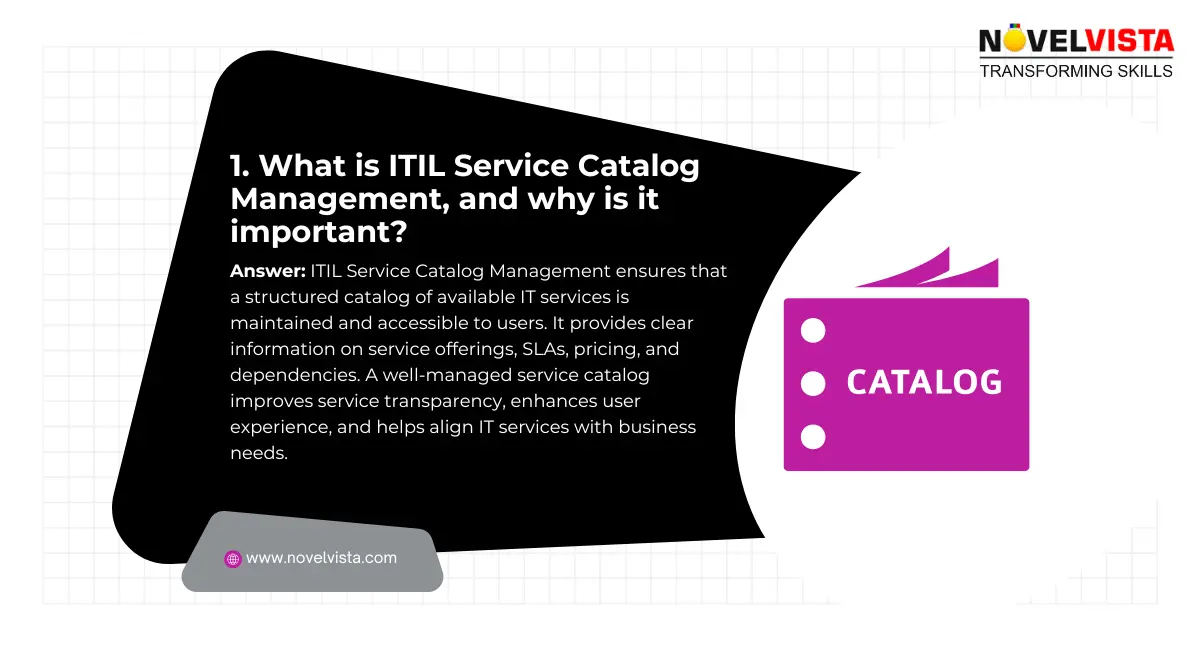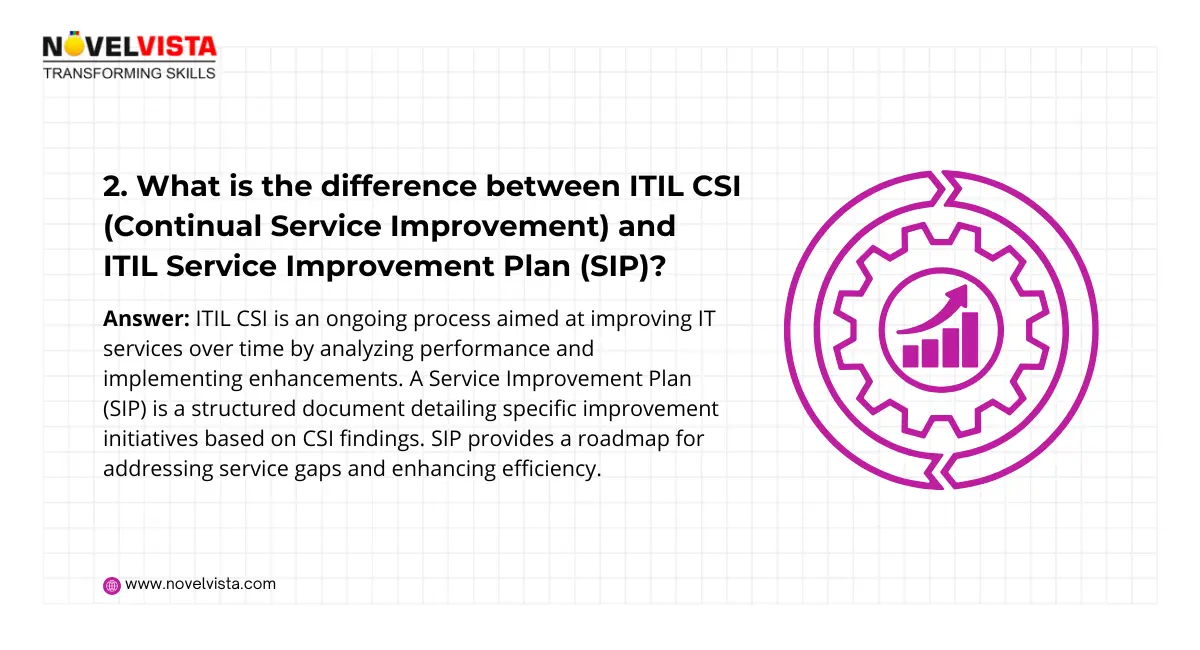The Information Technology Infrastructure Library i.e. ITIL, is the bedrock of IT service management. If you're an outsider delving into the IT industry or a seasoned individual looking for an interview in the same field, you have to have a firm grip on the ITIL service lifecycle questions and frameworks as well as their real-life applications. Employers want someone who can relate IT services to business goals, streamline processes, and increase customer satisfaction.
Undoubtedly, it’s the ITIL framework!
And from the day ITIL v3 has been updated to ITIL v4, it’s been turning tables for IT service management for sure. As we all know, downtime on IT can cause huge business losses. With all the organizations wanting to achieve zero downtime, ITIL 4 has been a savior since it offers strong, develop, and time-tried practices that have pertinence to a wide range of service associations. And this goes without saying, ITIL v4 certified professionals are the need of the hour right now.
But, getting a job is not very easy in the ITIL field. In our previous article “How to crack an interview in ITIL”, we have given you 10 tips to crack an ITIL interview. You need to take care of a few basic things to do that.
Here’s a little brief of that in case you missed it:
In this guide, 50+ must-know ITIL interview questions along with proven answers will help you navigate your next interview with confidence. Also, you will find a PDF where category-based interview questions and answers are explained. From the fundamentals of ITIL to the highly advanced process management strategies, we lay it all out for you.
Mastering ITIL framework questions will become the cherry on top, giving further insights into ITIL's application in the fast-paced modern digital world. With that out of the way, let's first delve into some most asked interview questions honoring ITIL and its demand.
ITIL is a framework for imparting some best practice standards for IT service management globally, whose aim is to improve efficiency and effectiveness, reduce risks, and enhance customer satisfaction.
It contains globally accepted practices for the delivery of IT services that are of the required quality, and align with the business objectives. The digital-first use of ITIL is in high demand since organizations need ITSM for operational excellence.
In this day, where organizations have been going forth with cloud computing, automation, and AI-driven solutions, it becomes pertinent that organized IT processes are therefore required, thereby requiring ITIL-certified professionals who can streamline work orders, minimize overall downtime, and enhance service delivery. For this reason, an ITIL specialist is highly marketable.
Ans:The ITIL (Information Technology Infrastructure Library) is one of the frameworks of best practices for IT service management (ITSM). ITIL processes and procedures help streamline IT operations and enhance the efficiency of service delivery. Thus, ITIL effectively connects IT services to business.
Ans:ITIL V3 organizes all ITIL processes into 5 service lifecycle stages:
Ans:The major benefits of ITIL are:
Ans:The main benefits ofService Deskimplementation are as follows:
Ans:Workflow and procedure diagrams are utilized by the service desk.

Ans:The main objectives of the incident management process are:
Ans:Theincident management systemconsists of the following steps:
Ans:Incident Management is the process of managing the lifecycle of incidents that are reported. It consists of several steps that must be carried out to resolve and document the incidents.
Ans:An SLA or Service Level Agreement is a commitment between the internal or external service provider and the end-user. It represents the level of service assumed by the service provider.
Ans:There are 3 types of SLA:
Ans: The purposes ofProblem Managementare:
Ans:The stages of the overall Problem Management process are as follows:
Ans:A Known Error is a problem that has a recorded root cause and a workaround.
Ans:You can close a Know Error depending on the following conditions:
Ans:The objectives of the IT Service Continuity Management are:
Ans:The PDCA cycle is a 4 step management method used for control and continuous improvement of a product/process in a business. It is also known as the Deming cycle/ circle/wheel.
The phases are categorized into:
Ans:The primary purpose of Configuration Management is to collect, store, manage, update, and verify data on IT assets and configurations in the enterprise.
Ans:A project has a finite lifespan. A process is continuous and has no end date.
Ans:The responsibilities of anITIL Service Deskare:
Ans:Reactive problem management identifies and eliminates the root cause of known incidents. On the other hand, proactive problem management prevents incidents by finding potential problems and errors in the IT infrastructure.
Ans: An incident is an event that leads to unplanned interruption to an IT service.
On the other hand, a problem is an underlying cause of one or more incidents.
Ans:The key benefits of ITIL include the enhancement of service efficiency, reduction of IT costs, and the increase of customer satisfaction. It also helps optimize risk management and ensure continual improvement of service. These benefits allow organizations to reach operational excellence.
Ans:The five stages are: Service Strategy, Service Design, Service Transition, Service Operation, and Continual Service Improvement (CSI). Each of these stages helps in effectively managing IT services, and when completed with utmost efficiency, all stages will guarantee that the IT services delivered to support the business objectives of the organization.
Ans:SLA is a legal agreement between the service provider of IT services and the customer. It states service expectations, performance parameters, and responsibilities. Underwriting the SLA will ensure the accountability and quality of services.

Ans:An incident is a single malfunction in the service that requires fixing immediately. A problem identifies the root cause of several incidents that require deeper investigation; this is whereby problem management applies to avert the occurrence of such incidents in the future.
Ans:Types of SLAs in ITIL
Ans:Change management ensures that changes to the IT environment are carried out with minimal disruption. Any change requires a structured assessment of risks and approvals. This process enhances stability and; therefore, reduces downtime for services.
Ans:Types of Changes in ITIL
Ans:The CAB is responsible for processing major IT changes. It evaluates risks, and impact on business and ensures minimalistic disruption to service. It helps ensure that service reliability is kept intact while changes are being made.
Ans:Problem Management seeks to analyze problems and eliminate the root causes of incidents. Thus, preventing recurring problems provides stability for the service, with both proactive and reactive approaches.
Ans:Proactive Problem management and Reactive Problem management
Both are methods that provide improvement in the reliability of services and minimize disruptions.
Ans:Configuration Management is a process of tracking all IT assets, such as hardware, software, and network components, which is a major data source for IT for accurate decision-making and troubleshooting. Service efficiency and risk reduction are improved.
Ans:Capacity Management ensures that sufficient resources are available to satisfy the present and future demands of the business. The risk of performance degradation can be averted by optimizing the involved IT infrastructures; thus increasing the availability of the service.
Ans:Availability Management is the monitoring of the IT services according to the agreed SLAs. Ensure reduced downtime and increase service reliability for the benefit of an enterprise's continuous business operations.
Ans:Service Request Management is the consideration given to requests from users for standard IT service. Examples include password resets and installing software. It helps ensure that routine fulfillment of services is speedy.
Ans:Incident Management is the process of restoring services as quickly as possible, thus minimizing the impact of IT disruptions on business operations. In this context, the term "efficient" translates into as quick a time as possible in resolving the issue.
Ans:Knowledge Management ensures IT teams and users have access to accurate information and thus should improve the quality of decision-making and efficiency in the services offered. This serves to reduce incidents from repetition and enhance support processes.
Ans:Release Management includes designing, building, and testing processes with controlled release of new or updated IT services. These will avoid interruptions with their use and promote stability.
Ans:ITIL serves to enhance the quality of services and in aligning IT operations with business objectives. It improves the handling of risks while also boosting operational efficiency. All these are factors that would lead to favorable business outcomes.
Ans:Most of the practices learned from these professionals are based on best practices for ITSM. They help organizations in making IT process improvements that lead to cost reductions and service delivery efficiencies. They will be assets in any organization.
Ans:Knowledge Management makes sure that both the IT teams and users have access to the right information. It enables people to make better decisions and makes services more efficient. This leads to a reduction in recurring incidents and enhances the entire support process.
Ans:Release Management ensures a smooth transition for new or changed IT services into operation while minimizing any disruption to services and maximizing their stability. Involves planning, testing, and controlled release.
Ans:ITIL Risk Management refers to the process of identifying, assessing, and mitigating risks that are related toITIL service management. Most importantly, it ensures that risks are addressed proactively to avoid their effects on service delivery; thus sustaining service dependability.
Ans:It is where all IT assets, their configurations, and inter-relationships are housed. CMDB allows IT teams to keep track of changes, troubleshoot issues, and provide better service management. Hence, a well-maintained CMDB increases the effectiveness of IT.
Ans:Event Management observes any significant changes or alerts upon IT infrastructure. Any potential issues are addressed before they become real problems. The ultimate goal is to ensure system stability and performance.
Ans:ITIL Financial Management controls the budgeting, accounting, and cost of IT services. It ensures that IT expenditure is correlated to business value. This aids in optimizing financial planning for IT operations.
Ans:Service Portfolio Management makes certain that IT Services follow the Business Strategy. Usually, it manages the entirety of a service's lifecycle, from planning to retirement. This ensures efficient resource allocation.
Ans:Demand Management forecasts and manages customer demand for IT Services. This ensures that IT Resources are allocated in demand. Hence, it avoids any unanticipated capacity shortages or over-provisioning.
Ans:ITIL provides structured ITSM processes that can support cloud computing, automation, and AI adoption. It provides businesses with agile and scalable IT services. This helps organizations remain competitive in the digital environment.
Ans:ITIL-certified professionals have expertise in ITSM best practices. They help organizations optimize IT processes, cut costs, and deliver better services. Therefore, organizations treasure their presence.
MasteringNovelvista’sITIL incident management questions and their basic concepts is essential for anyone pursuing a career in IT service management. These 30 interview questions cover key ITIL principles, from service lifecycle and change management to problem resolution and risk mitigation. Understanding these topics will not only help you crack ITIL job interviews but also enable you to implement best practices in real-world IT environments.
As businesses continue to prioritize efficiency and service excellence, ITIL-certified professionals remain in high demand. Here, theITIL 4 Foundation Certification Training Coursewill help you to keep updated with ITIL frameworks, practice these questions, and approach your interview with confidence to secure your next ITIL job opportunity. Best of luck!
Advance your IT Career with ITIL 4 Foundation Certification
If you go through these ITIL interview questions, you are definitely going to rock the interview. Also, do you know what really helps during the ITIL interview? An ITIL 4 certification! And you’ll be happy to know, we can provide you both ITIL 4 training and certificationat a very minimum cost! Grab it, be confident, and start your journey towards the world of ITIL!
Confused about our certifications?
Let Our Advisor Guide You